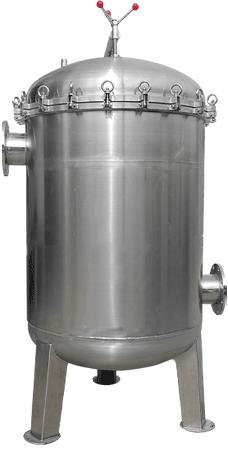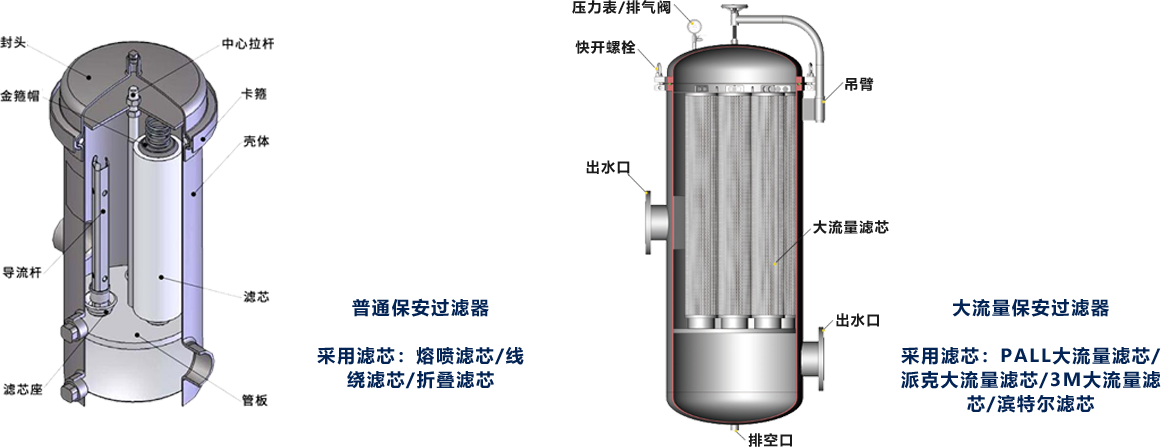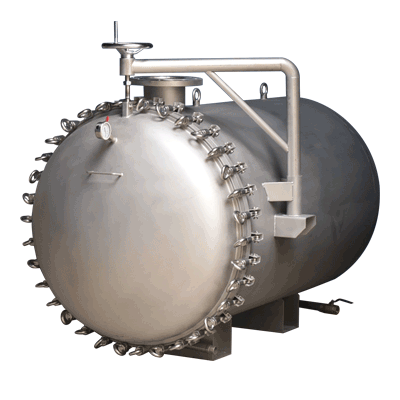The significance of using security filters in the steel mill industry
The production process of steel plants requires the use of large amounts of water as raw materials or coolants. Impurities and microorganisms in the water often cause corrosion or blockage of equipment, affect production efficiency, and may even cause damage to equipment and cause economic losses. Therefore, it is very important to regard water treatment as a key link in the production process of steel plants, and security filters play an indispensable role in this link.
As the core equipment of the steel plant's water treatment system, the security filter's efficient filtration performance, elegant self-cleaning ability and simple and convenient maintenance methods undoubtedly play a vital role in ensuring the normal production of the steel plant. In the future, this technology will be more widely used, providing better and more affordable water treatment solutions to more industries.

Detailed application
Cooling water treatment: During the steel processing process, a large amount of heat is generated, making water as a coolant very important. The water in the cooling water system needs to be circulated between equipment. Therefore, any impurities or microorganisms may cause corrosion or blockage of the equipment and affect cooling efficiency. By equipping with security filters, water quality can be greatly improved, equipment service life can be extended, production efficiency can be improved, and operating costs can be reduced.
Boiler water treatment: All or part of the steam generated during the production process comes from the boiler. The working efficiency of the boiler and the service life of the equipment are directly related to the production cost of the factory. Therefore, it is crucial to ensure the quality of boiler water. By continuously filtering impurities in the boiler water, the security filter can effectively improve the quality of steam, increase the working efficiency of the boiler, and ensure the safe operation inside the furnace.
The security filter is a filtration device that uses physical filtration methods to remove solid impurities in liquids. Its working principle is mainly based on the screening principle. It uses one or more fine filter elements to deeply filter the flowing liquid using its internal micropores, thereby achieving the purpose of removing solid impurities such as particles, suspended matter and microorganisms in the liquid.

The detailed working process of the security filter:
Input: The liquid to be treated first flows into the filter through the input end of the filter. According to the set requirements, the liquid can be raw water, raw liquid or other liquids that need to be filtered.
Pre-filtration: After the liquid enters the filter, it will first pass through the pre-filtration part, which is the filter layer installed on the upper part of the filter housing. This filter layer can filter out larger impurity particles in preparation for the next step of deep filtration.
Depth filtration: After the liquid is pre-filtered, it then flows through the filter element for depth filtration. The micropores of the filter element can intercept and absorb tiny impurities and microorganisms in the liquid. The sizes of these micropores vary, and filter elements with different precisions can be selected as needed to meet filtration requirements.
Output: The filtered liquid flows out through the water outlet to complete the entire filtration process. The filtered liquid is purer and of good water quality, and can be directly used for the next step of production or domestic water.
Cleaning and replacement: After a period of use, more and more particles will accumulate on the surface of the filter element, which will reduce the filtration efficiency. At this time, the filter needs to be cleaned or the filter element needs to be replaced. For cleanable filter elements, you can choose backwashing or chemical cleaning to restore the filter's filtration capacity. For filter elements that cannot be cleaned, you need to replace the filter element with a new one.
Security filters have been widely used in many industries due to their high efficiency, stable filtration effect and convenient operation and maintenance. Whether used for primary filtration or terminal filtration, it can achieve very good filtration effects, ensure excellent water quality, and meet the water treatment needs of different industries and fields.
The advantages and characteristics of security filters can be summarized in detail as follows:
High filtration efficiency: The security filter has a very high filtration efficiency. It uses molded filter material to deeply filter the liquid stock, which can effectively intercept and remove various suspended solids, microorganisms and particle impurities. The filter residue remains on the wall of the filter tube, and the filtrate without dirt flows out through the filter device, ensuring that the outflow liquid is clean and pollution-free.
Low-resistance operation: The resistance of the security filter during operation is very small, allowing the flowing liquid to pass quickly without affecting the subsequent production process, and at the same time reducing the load on the equipment.
Easy-to-replace design: The design features of the security filter take into account the user's long-term use and maintenance. The filter element structure is set to be easy to replace, avoiding complicated and tedious operations when replacing the filter element.
Low operating costs: The operating costs of security filters are relatively low. On the one hand, it adopts a high-efficiency filter element design, which makes the filter element pollute slower during operation. On the other hand, due to its small loss, stability and long service life, its operation and maintenance costs are also relatively low.
Equipment protection: The security filter plays an important role in protecting equipment safety in the filtration system. It can prevent large substances and particles from blocking the equipment, protect the service life of the equipment, and avoid higher maintenance costs due to equipment damage in a short period of time.
Wide range of application fields: Security filters are used in a wide range of fields, such as metallurgy, chemical industry, petroleum, medicine, food and beverage and other industries. Whether it is used as a pre-filtration before fine filtration, or as a protective device before reverse osmosis, ultrafiltration and other equipment, it is very suitable for use.
Large flow processing capacity: With its unique design, the security filter has the ability to process a large amount of water flow, ensuring that the equipment can obtain sufficient clean water sources, and is very suitable for large flow water needs in industrial production.
As an efficient and stable filtration equipment, security filters are widely used in many fields. Its design features and operating characteristics fully take into account the user's needs and operating costs, which is also an important reason why security filters are widely used.

The structure of the security filter is mainly divided into two parts: filter and filter element. Its specific composition is as follows:
Filter housing: The filter housing is the outer shell of the filter. It is generally made of high-quality 304, 316L stainless steel, or carbon steel and resin housing, which has strength, corrosion resistance and good sealing properties. The filter housing not only protects, but also provides space for installing the filter element.
Filter element: The filter element is the key part of the security filter and is mainly responsible for filtration work. The filter element can be single-element or multi-element. The specific filter element material and specifications are selected according to the actual needs of the customer and the different filter materials. The formed filter materials include: filter cloth, filter mesh, filter disc, sintered filter tube, wire-wound filter element, melt-blown filter element, microporous filter element and multi-functional filter element, etc.
Interface part: The interface part of the filter mainly includes the inlet and outlet of the liquid, which is responsible for introducing the medium to be filtered into the filter and outputting the filtered medium.
Sealing device: Between the filter housing and the filter element, as well as the connection part of the filter housing, a sealing ring is required to prevent fluid leakage and ensure the normal operation of the filter.
Support frame: Also called a frame, it plays a supporting and fixing role, ensuring the stability of the filter during use.
Pressure gauge: The filter is equipped with a pressure gauge to monitor the membrane resistance of the filter element. When the pressure exceeds the set value, it means that the filter element needs to be replaced to ensure efficient operation of the filter.
Sewage outlet: This is a necessary part for filter cleaning and maintenance. Through the sewage outlet, the accumulated impurities on the filter element can be removed and its service life can be extended.
The filter element is the heart of the filter. There are many different types of filter elements depending on the actual filtration needs. Commonly used filter elements include sintered filter tubes, melt-blown fiber filter elements and honeycomb filter elements. Among them, the sintered filter tube is formed by sintering powder materials. The filter tube materials include ceramics, glass sand, plastic, etc. Melt-blown fiber filter elements are generally made of polypropylene as raw material, which is made by heating and melting, spraying, pulling, and receiving molding.
When selecting a security filter, we need to reasonably select the filter element material and pore size based on factors such as filtration requirements, media properties (impurity content, viscosity, temperature, pressure, etc.), working mode (continuous or intermittent), and provide the best filtration Effect.
There are various types of filter elements for security filters. Different types of filter elements have different filtration performance, mainly in terms of filtration accuracy, material durability, maximum operating temperature, etc. The following are some common types of security filter elements:
Sintered filter tube: Sintered filter tube is made by sintering powder materials into a tubular structure through a special sintering process. Sintered filter tubes can be divided into many types, such as sintered stainless steel filter tubes, sintered copper filter tubes, sintered ceramic filter tubes, etc. The selection of materials mainly depends on the nature of the filter media and the specific requirements of the filtration environment. The advantages of sintered filter tubes include extremely high filtration accuracy, corrosion resistance, high temperature resistance, structural stability and easy cleaning.
Melt-blown fiber filter element: The manufacturing process of melt-blown filter element is mainly to spray high molecular polymers such as polypropylene or polyester into fine fibers through the melt-blown process, and then condense on the aggregate layer to form a three-dimensional microporous structure. This filter element has efficient particle retention capacity and very good temperature and chemical stability. It is widely used in liquid filtration in the fields of food and beverage, pharmaceutical and microelectronics.
Wire-wound filter element: Wire-wound filter element is made of fiber materials such as cotton thread and polypropylene thread wrapped around a fixed skeleton to form a deep filtration structure. Its density and pore size are precisely controlled, so that the filter element has a large pollution capacity and high Filtration efficiency and long service life. They are usually used to filter large amounts of sediment, such as sand, mud, rust, etc.
Pleated filter element: The pleated filter element is a high-performance filter material folded into pleats through a special process, thereby greatly increasing the effective filtration area of the filter material, allowing the filter element to have a longer service life and a smaller size. Higher filtration efficiency. Pleated filter elements are widely used to filter pure water, drinking water, food and beverages, chemical raw materials, etc.
Activated carbon filter element: Activated carbon filter element is a filter in which powdered activated carbon is fixed on the filter element base material during the production process. Activated carbon has a very high specific surface area and can absorb colored and odorous substances, organic substances and residual chlorine in the water, thereby improving the color, smell and taste of the water. It is mainly used in household or commercial water purifiers.
Ceramic filter element: Ceramic filter element is made of natural ore, ceramic clay and other raw materials calcined at high temperature. The micropores are continuous and evenly distributed. It can effectively filter out suspended matter, sediment, bacteria, microorganisms and other harmful substances in the water. Due to its surface The size of the micropores is generally smaller than the size of viruses and bacteria, so it has extremely high biological safety and is a good choice for tap water, mineral water, drinking water and other substances.
The above are common filter element types, but in actual selection, the actual needs of the filtration system need to be taken into consideration, such as the nature of the filter media, the requirements for filtration precision, temperature and pressure conditions, chemical stability requirements, etc.








